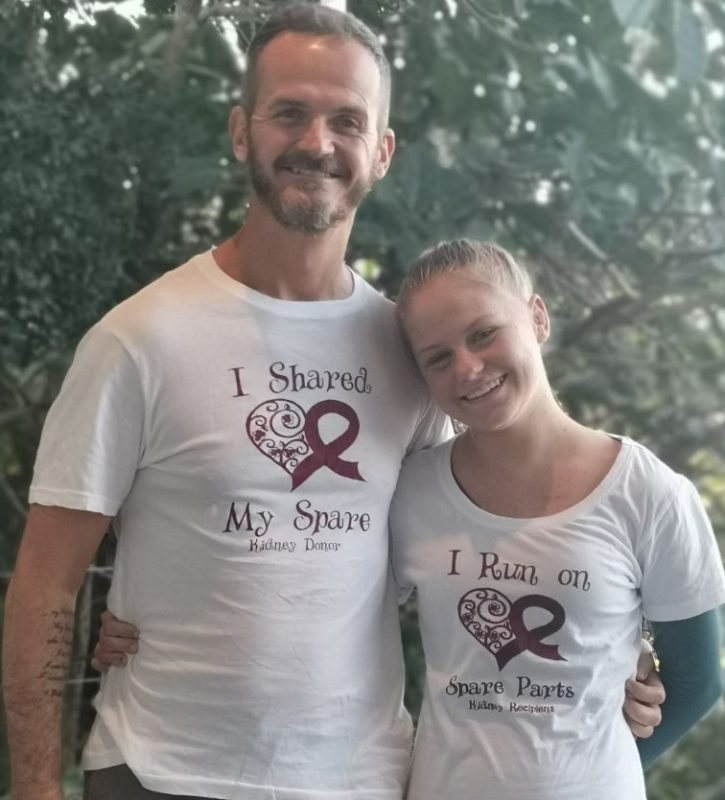NATIONAL NEWS - According to Transplant Education for Living Legacies (Tell), over two million people worldwide receive treatment with dialysis or a kidney transplant. Many more would require treatment but do not receive it mostly due to lack of access.
South Africa has one of the highest rates of end-stage kidney failure in the world and a very low rate of organ and tissue donation and transplants, and the lack of education in the medical field and the public at large only makes matters more difficult.
South Africa is also one of 12 on the African continent that do kidney transplants and the only one that does transplants from deceased donors. Not everyone who has end-stage kidney failure will qualify to be placed on the waiting list and the patients that are on it face an average waiting period of 12-15 years for the O-blood group.
Living donors are becoming a life-saving alternative for patients that can find a matching donor, this would either be a family member (living-related donor), a friend (unrelated living donor) or a stranger (altruistic donor).
These living donors go through extensive tests to ensure that they will be able to withstand the operation and that they are healthy enough to live with one kidney.
Paul Nel, donated his kidney to his daughter, Tanya in June this year. Tanya suffers from a rare genetic disease that caused her kidneys to fail at the age of 18. She was always tired and the dialysis gave her bad headaches.
As a family, any holiday or even just a weekend away had to be meticulously planned to ensure there was a dialysis unit close by and that they had available slots to accommodate Tanya. Paul did not hesitate to go for tests to see if he was a match to be a donor for his daughter.
The transplant was postponed twice, first due to Tanya’s access (fistula failing) and the second time due to Covid.
Both father and daughter are doing very well after the operation, Tanya can focus on her studies and spending time with family and friends. Paul says that he did not anticipate the life-changing impact the transplant would have on not only his daughter but the whole family.
 Paul and Tanya Nel after her kidney transplant. Photo supplied.
Paul and Tanya Nel after her kidney transplant. Photo supplied.
Eight golden rules for kidney health
You can lose up to 90% of your kidney function before showing any signs or symptoms. World Kidney Day, a global awareness campaign that was commemorated on March 11 this year, highlighted eight golden rules to follow to ensure you keep your kidneys healthy.
1. Monitor and control your blood pressure
It is good practice to know what your blood pressure is; as high blood pressure can damage your kidneys and cause Chronic Kidney Disease (CKD) which can progress to End-Stage Renal Disease (ESRD).
Normal blood pressure is 120/80, if your blood pressure is above this level when measured on two different days, consult your healthcare provider to discuss lifestyle and dietary changes to control your blood pressure.
2. Control your blood sugar level
Many people who are diabetic develop ESRD, therefore it is important to maintain your blood sugar levels and have your kidney function tested regularly. With early detection, the progression to ESRD from diabetes can be reduced or even prevented.
3. Get moving
Some of the benefits of regular exercise are:
- maintaining your ideal body weight,
- reducing blood pressure, and
- reducing the risk of developing CKD.
4. Eat a healthy diet and keep your weight stable
Eating a healthy diet can help prevent a lot of lifestyle-related diseases such as diabetes, heart disease and other chronic condition associated with Chronic Renal Failure. Keeping your weight in check put less stress on all your organs. Limit your salt intake to 5-6 grams a day (a teaspoon). Processed food contains a lot of salt, it is best to prepare your meal from fresh ingredients whenever possible.
5. Drink enough water
Your kidneys will thank you for looking after them, drinking enough water helps clear your system of excess minerals such as sodium, potassium and phosphates which can cause damage to your organs and ultimately death. The ideal amount of fluid you need to take will be influenced by how active you are, the climate you stay in, health conditions, pregnancy and breastfeeding. Consult your doctor on the appropriate fluid intake for your condition.
6. Don’t start to smoke and quit if you do
Smoking causes less blood to reach your kidneys which in turn cause them to not function properly, and if your kidneys don’t function properly they cannot clear your body of excess minerals and toxins.
7. Avoid taking over-the-counter anti-inflammatory medication regularly
If you take over-the-counter non-steroidal anti-inflammatory medication (such as ibuprofen) regularly, you could be putting your health at risk of developing CKD. Consult your healthcare professional to manage your pain and protect your kidneys.
8. Get your kidney function checked regularly if you are in the high-risk group
You are considered to be at a high risk to develop CKD if you have:
- diabetes
- hypertension
- a family history of kidney disease
- are obese
Unfortunately, there is no cure for CKD, but it can be prevented and the progression to ESRD can be managed. Make sure that you follow the eight golden rules to look after your kidneys.
For more information email stella.dekock@tell.org.za, call 082 785 2530, or visit their website here.















